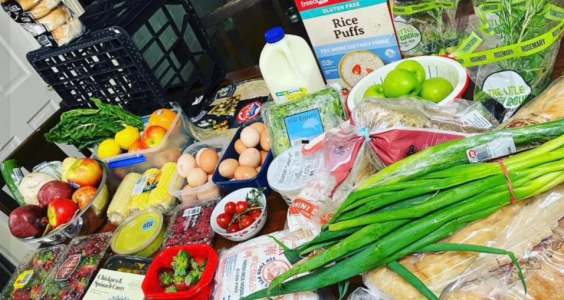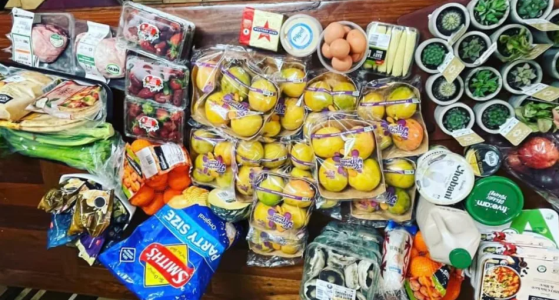Discover how this savvy Mum saves $600 weekly on groceries!
In an era where the cost of living is skyrocketing, some Australians resort to unconventional and potentially risky methods to save on their weekly grocery bills.
One such method that has recently shocked shoppers is dumpster diving.
A mother has shared her experience saving thousands of dollars annually by sourcing her family's food from supermarket bins.
'Here is a controversial but effective extra income source. I haven't paid for a grocery bill in years,' she wrote on social media, sharing a photo of her impressive hauls.
These included a variety of fruits and vegetables, 'fancy' bread, almond milk, orange juice, eggs, dairy milk, and even ready-made meals.
‘Most times, things are thrown out because one apple has gone soft in a carton where the rest are lovely. They can't sell the rest, though, so it gets turfed. I have no problem washing the rest and sticking them in the fridge,’ she explained.
Her finds were not limited to food items. She also managed to source washing detergent, shampoo, cleaning products, and deodorant from the bins, stating, 'Kmart bins are the bomb'.
The woman claimed that her dumpster diving strategy significantly reduced household spending.
'It's been a few years, and we are doing fine and saving about $600 a week,' she said.
However, she clarified that her motivation was not desperation or poverty, but a matter of principle. She expressed her resentment towards corporations like Coles and Woolworths, making billions while the cost of living rises and people go hungry.
‘I am not forced to do it, but I choose to because of my values and politics,’ the mum added.
Dumpster diving is technically illegal in Australia due to its association with trespassing on private property to access dumpsters. But the woman claimed she had never encountered legal issues while rummaging through supermarket bins.
‘Yes, I have been approached by curious staff and security and, at times, have been asked to move on. I usually move on as soon as I see staff around anyway. I've never gotten into trouble,’ she recalled.
The post sparked mixed reactions, with some users expressing shock at the amount of edible discarded food, while others voiced concerns about potential health risks, such as food contamination and poisoning.
‘Most of this still looks like it's good stuff. Sad to see how much food waste there is in first-world countries when so many people are starving around the world,’ one social media user commented.
‘I'm surprised! The food actually looks very fresh!’ another said.
While the majority of food waste in Australia is generated by households, costing up to $2,500 per home each year, charity OzHarvest reported that around 7.6 million tonnes of food is wasted across the food supply chain.
This includes sectors such as farming, processing and transport, hospitality operators, and supermarkets.
Meanwhile, the demand for food relief among charities is now at an all-time high, having jumped 73 per cent in the past six months.
Dumpster diving may seem desperate for some, but many dumpster divers like the anonymous mum are motivated by environmental concerns, anti-consumerism, or even simply the thrill of finding something for nothing.
However, dumpster diving is not without its risks. Aside from the legal implications, there are potential health hazards to consider.
Food items retrieved from bins may have been exposed to bacteria, pests, or harmful substances. There's also the risk of inadvertently consuming recalled or expired products.
For those considering dumpster diving to save on groceries, it's crucial to be aware of these risks and take necessary precautions. This could include thoroughly washing any retrieved food items, checking for recall notices, and avoiding items exposed to unsanitary conditions.
For more tips on dumpster diving, you may read this article.

What are your thoughts on dumpster diving, members? Have you ever considered dumpster diving, or do you know someone who has? Share your thoughts and experiences in the comments below.
One such method that has recently shocked shoppers is dumpster diving.
A mother has shared her experience saving thousands of dollars annually by sourcing her family's food from supermarket bins.
'Here is a controversial but effective extra income source. I haven't paid for a grocery bill in years,' she wrote on social media, sharing a photo of her impressive hauls.
These included a variety of fruits and vegetables, 'fancy' bread, almond milk, orange juice, eggs, dairy milk, and even ready-made meals.
‘Most times, things are thrown out because one apple has gone soft in a carton where the rest are lovely. They can't sell the rest, though, so it gets turfed. I have no problem washing the rest and sticking them in the fridge,’ she explained.
Her finds were not limited to food items. She also managed to source washing detergent, shampoo, cleaning products, and deodorant from the bins, stating, 'Kmart bins are the bomb'.
The woman claimed that her dumpster diving strategy significantly reduced household spending.
'It's been a few years, and we are doing fine and saving about $600 a week,' she said.
However, she clarified that her motivation was not desperation or poverty, but a matter of principle. She expressed her resentment towards corporations like Coles and Woolworths, making billions while the cost of living rises and people go hungry.
‘I am not forced to do it, but I choose to because of my values and politics,’ the mum added.
Dumpster diving is technically illegal in Australia due to its association with trespassing on private property to access dumpsters. But the woman claimed she had never encountered legal issues while rummaging through supermarket bins.
‘Yes, I have been approached by curious staff and security and, at times, have been asked to move on. I usually move on as soon as I see staff around anyway. I've never gotten into trouble,’ she recalled.
The post sparked mixed reactions, with some users expressing shock at the amount of edible discarded food, while others voiced concerns about potential health risks, such as food contamination and poisoning.
‘Most of this still looks like it's good stuff. Sad to see how much food waste there is in first-world countries when so many people are starving around the world,’ one social media user commented.
‘I'm surprised! The food actually looks very fresh!’ another said.
While the majority of food waste in Australia is generated by households, costing up to $2,500 per home each year, charity OzHarvest reported that around 7.6 million tonnes of food is wasted across the food supply chain.
This includes sectors such as farming, processing and transport, hospitality operators, and supermarkets.
Meanwhile, the demand for food relief among charities is now at an all-time high, having jumped 73 per cent in the past six months.
Dumpster diving may seem desperate for some, but many dumpster divers like the anonymous mum are motivated by environmental concerns, anti-consumerism, or even simply the thrill of finding something for nothing.
However, dumpster diving is not without its risks. Aside from the legal implications, there are potential health hazards to consider.
Food items retrieved from bins may have been exposed to bacteria, pests, or harmful substances. There's also the risk of inadvertently consuming recalled or expired products.
For those considering dumpster diving to save on groceries, it's crucial to be aware of these risks and take necessary precautions. This could include thoroughly washing any retrieved food items, checking for recall notices, and avoiding items exposed to unsanitary conditions.
For more tips on dumpster diving, you may read this article.
Key Takeaways
- A mum found a controversial way to save money on groceries: scavenging unused items from supermarket bins.
- Through her method, she's claimed to save approximately $600 a week and hasn't paid for groceries in years.
- Reactions to her dumpster diving strategy have been mixed, with some acknowledging the amount of food waste, while others expressed concern over health risks.
- The charity OzHarvest highlighted that food waste in Australia, including from supermarkets, contributes to about 7.6 million tonnes each year across the food supply chain.
What are your thoughts on dumpster diving, members? Have you ever considered dumpster diving, or do you know someone who has? Share your thoughts and experiences in the comments below.









